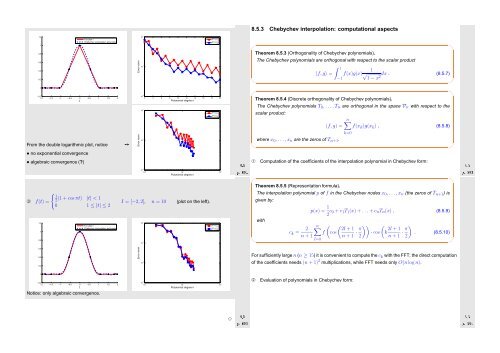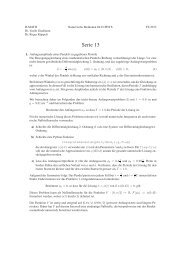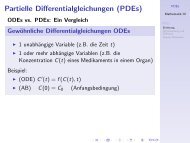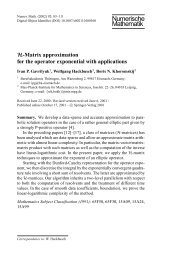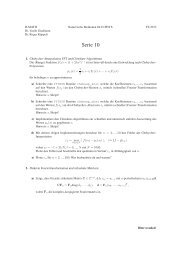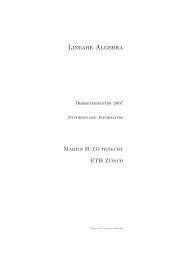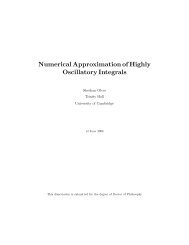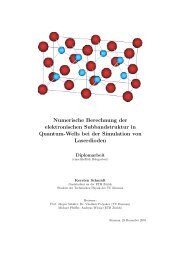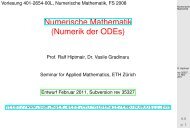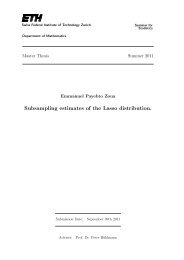Numerical Methods Contents - SAM
Numerical Methods Contents - SAM
Numerical Methods Contents - SAM
Create successful ePaper yourself
Turn your PDF publications into a flip-book with our unique Google optimized e-Paper software.
8.5.3 Chebychev interpolation: computational aspects<br />
1.2<br />
1<br />
Function f<br />
Chebychev interpolation polynomial<br />
||f−p n<br />
|| ∞<br />
||f−p n<br />
|| 2<br />
✬<br />
✩<br />
0.8<br />
Theorem 8.5.3 (Orthogonality of Chebychev polynomials).<br />
0.6<br />
0.4<br />
0.2<br />
Error norm<br />
10 −1<br />
The Chebychev polynomials are orthogonal with respect to the scalar product<br />
∫ 1 1<br />
〈f,g〉 = f(x)g(x) √ dx . (8.5.7)<br />
−1 1 − x 2<br />
✫<br />
✪<br />
0<br />
✬<br />
✩<br />
−0.2<br />
−2 −1.5 −1 −0.5 0 0.5 1 1.5 2<br />
t<br />
From the double logarithmic plot, notice<br />
• no exponential convergence<br />
• algebraic convergence (?)<br />
➙<br />
Error norm<br />
10 0 Polynomial degree n<br />
10 −2<br />
2 4 6 8 10 12 14 16 18 20<br />
||f−p n<br />
|| ∞<br />
||f−p n<br />
|| 2<br />
10 −1<br />
10 −2<br />
10 0 10 1 10 2<br />
10 0 Polynomial degree n<br />
Ôº½ º<br />
Theorem 8.5.4 (Discrete orthogonality of Chebychev polynomials).<br />
The Chebychev polynomials T 0 , ...,T n are orthogonal in the space P n with respect to the<br />
scalar product:<br />
n∑<br />
(f, g) = f(x k )g(x k ) , (8.5.8)<br />
k=0<br />
where x 0 , ...,x n are the zeros of T n+1 .<br />
✫<br />
✪<br />
Ôº¿ º<br />
➀ Computation of the coefficients of the interpolation polynomial in Chebychev form:<br />
✬<br />
✩<br />
➂ f(t) =<br />
{ 12 (1 + cos πt) |t| < 1<br />
0 1 ≤ |t| ≤ 2<br />
I = [−2, 2], n = 10 (plot on the left).<br />
Theorem 8.5.5 (Representation formula).<br />
The interpolation polynomial p of f in the Chebychev nodes x 0 , ...,x n (the zeros of T n+1 ) is<br />
given by:<br />
p(x) = 1 2 c 0 + c 1 T 1 (x) + ... + c n T n (x) , (8.5.9)<br />
1.2<br />
1<br />
0.8<br />
Function f<br />
Chebychev interpolation polynomial<br />
10 −1<br />
||f−p n<br />
|| ∞<br />
||f−p n<br />
|| 2<br />
with<br />
✫<br />
c k = 2<br />
n + 1<br />
n∑<br />
l=0<br />
( ( 2l + 1<br />
f cos<br />
n + 1 · π )) (<br />
· cos k 2l + 1<br />
2 n + 1 · π )<br />
. (8.5.10)<br />
2<br />
✪<br />
0.6<br />
0.4<br />
0.2<br />
Error norm<br />
10 −2<br />
For sufficiently large n (n ≥ 15) it is convenient to compute the c k with the FFT; the direct computation<br />
of the coefficients needs (n + 1) 2 multiplications, while FFT needs only O(n log n).<br />
0<br />
−0.2<br />
−2 −1.5 −1 −0.5 0 0.5 1 1.5 2<br />
t<br />
Notice: only algebraic convergence.<br />
10 0 Polynomial degree n<br />
10 −3<br />
10 0 10 1 10 2<br />
➁<br />
Evaluation of polynomials in Chebychev form:<br />
Ôº¾ º<br />
✸<br />
Ôº º


